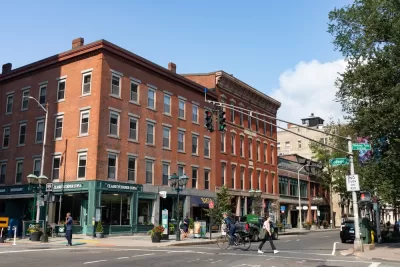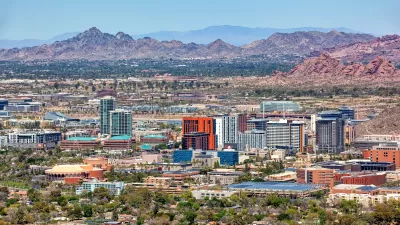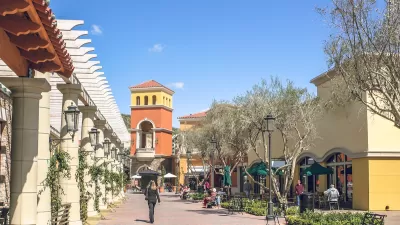Despite recent claims to the contrary, the concept of the 15-minute city promotes freedom of mobility and universal access to a city’s resources and amenities.

Proving the old adage that when all you have is a hammer everything looks like a nail, conspiracy theorists have descended on the 15-minute city concept as the latest target of alt-right paranoia. Having discovered the concept earlier this year, some conspiracists are claiming that 15-minute city policies will implement mandatory restrictions on movement and take away personal freedoms.
They won’t.
Writing in The Washington Post, Lara Williams describes how the theories took hold, starting with an uproar over an innocuous plan to improve pedestrian facilities and reduce the need for car trips proposed in Oxford, England.
Mix high levels of distrust in governments and institutions with pandemic lockdowns, an underlying conspiracy theory about a “new world order” and an urban planning concept backed by an international network of mayors, and garnish with a toxic car culture. Marinate on the internet, and voila! You now have a lot of people primed to believe that local councils are going to imprison them in 15-minute zones.
Sander van der Linden, author of Foolproof: Why We Fall for Misinformation and How to Build Immunity, suggests that the best way to prevent the spread of these theories is to preempt misinterpretations and train people to recognize manipulation techniques employed by promoters of conspiracy theories. To recap: the 15-minute city is a guiding principle toward reducing the need for car trips and improving public health and public spaces. “It’s really quite wholesome, rooted in making humans and the planet happier.”
FULL STORY: No, 15-Minute Cities Aren’t a Threat to Civil Liberties

Maui's Vacation Rental Debate Turns Ugly
Verbal attacks, misinformation campaigns and fistfights plague a high-stakes debate to convert thousands of vacation rentals into long-term housing.

Planetizen Federal Action Tracker
A weekly monitor of how Trump’s orders and actions are impacting planners and planning in America.

Chicago’s Ghost Rails
Just beneath the surface of the modern city lie the remnants of its expansive early 20th-century streetcar system.

Bend, Oregon Zoning Reforms Prioritize Small-Scale Housing
The city altered its zoning code to allow multi-family housing and eliminated parking mandates citywide.

Amtrak Cutting Jobs, Funding to High-Speed Rail
The agency plans to cut 10 percent of its workforce and has confirmed it will not fund new high-speed rail projects.

LA Denies Basic Services to Unhoused Residents
The city has repeatedly failed to respond to requests for trash pickup at encampment sites, and eliminated a program that provided mobile showers and toilets.
Urban Design for Planners 1: Software Tools
This six-course series explores essential urban design concepts using open source software and equips planners with the tools they need to participate fully in the urban design process.
Planning for Universal Design
Learn the tools for implementing Universal Design in planning regulations.
planning NEXT
Appalachian Highlands Housing Partners
Mpact (founded as Rail~Volution)
City of Camden Redevelopment Agency
City of Astoria
City of Portland
City of Laramie





























